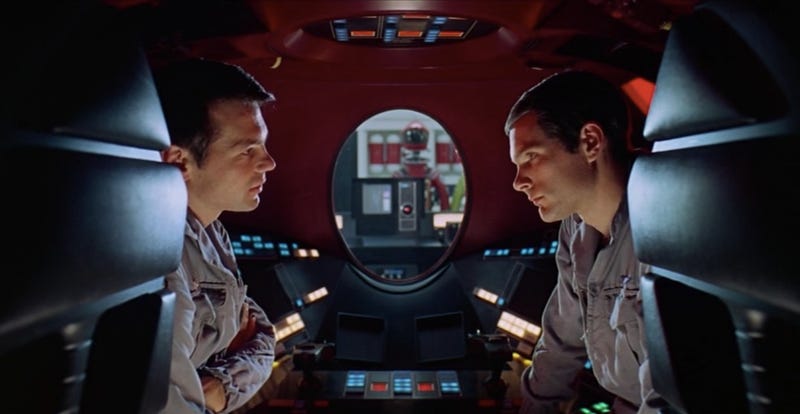I just want to start by saying that this scene:


reminded me of the old Windows (the media player) animations. You know, the ones that used to play when you listened to music on your desktop as a kid…




So during this scene, I was half-expecting an Alicia Keys track to come on.
All that aside, I did like the movie. Although the windows media scene was long, the visuals were really good, especially for their time.
I think my favorite visual storytelling moment was when they show the two astronauts’ conspiring, out of HAL’s earshot:

Then show HAL’s perspective:

They do a great job of nonverbally conveying that HAL can read lips. I also like that they avoid clunky exposition. I think because the movie was so long, they were able to give little bits of exposition at a time in a way that felt natural.
The movie was thought-provoking, too. In response to the question, “Is HAL capable of genuine emotion?”, one of the astronauts says he doesn’t really know if HAL is. HAL is their friend, but because he’s programmed to emote certain ways it’s unclear if his emotions can be genuine. This scene made me wonder why we don’t also view ourselves as incapable of genuine emotion… After all, we are, in a sense, programmed by our genes to have certain tempers, etc. So why don’t we view ourselves as incapable of genuine emotion? Is it because our ‘programmer’ isn’t known and possibly doesn’t exist? If HAL weren’t a man-made object, would they then view his emotions as genuine? If we knew our emotions were ‘programmed’, or predetermined by some outside force, would we also discount our emotional experiences? If humans could change the temper of unborn children or code our children to emote in certain ways, would we then assert that these babies are incapable of genuine emotional response? If HAL can commit a crime of passion, like murder of friends… if he can be passive aggressive, then wouldn’t all these acts be proof of his emotional capability? What should count as “genuine emotion”? And do our definitions of genuine emotion purposefully exclude AI? Will our definitions ever evolve to include AI as genuinely capable of emotion? What factors would cause us to treat AI as capable of genuine emotion?
Anyway, for anyone wanting to process the movie, I recommend checking out this video out: link: https://www.youtube.com/watch?v=8KLujOXs8wg
And I think this is where I’ll end my post.

One of the most interesting parts of the movie was indeed the humanizing of HAL. The fact that the movie was released int he 60s predicting a near-human machine like HAL shows how insightful the script turned out to be, given modern day Artificial Intelligence.
I think this movie is very relevant to where our society is going in the future. We are going to move towards artificial intelligence that is very close to how humans interact. We are going to have to ask ourselves if the robots that we programmed how genuine emotions or not?
This has definitely been noted before, but I’ll add it here – one of the things I love about how isn’t just that he’s portrayed as human, he’s portrayed as _more_ human than the other characters in the film, especially those he interacts with. This is another idea that gets explored in other films (Blade Runner comes to mind) but seems to have a sort of start here. I entirely agree with the point about “genuine emotion” being ill defined, though. Couldn’t agree more.